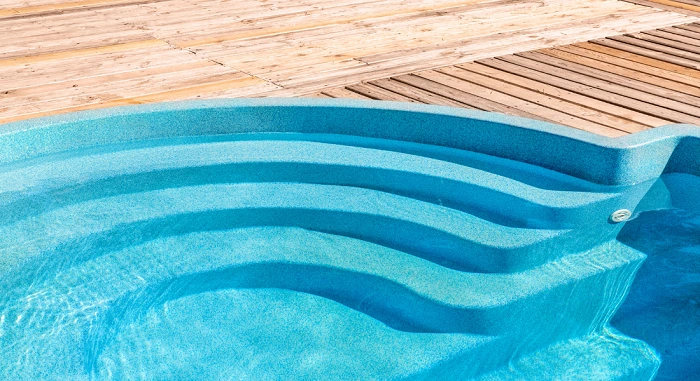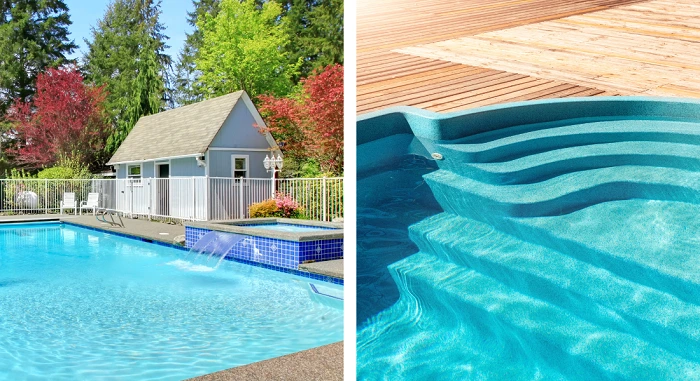When it comes to choosing a swimming pool for your backyard oasis, fiberglass swimming pools have gained popularity for their sleek appearance, quick installation, and smooth finish. However, like any other option, fiberglass swimming pools come with their own set of advantages and disadvantages. In this article, we’ll delve into the pros and cons of fiberglass swimming pools, focusing on their durability and longevity, answering the burning questions: How long will a fiberglass pool last, and are fiberglass pools truly long-lasting?
Fiberglass swimming pools have revolutionized the inground swimming pool industry, offering a variety of benefits that cater to modern homeowners’ preferences. However, it’s essential to consider both the advantages of fiberglass and potential drawbacks before making an informed decision. If you’re considering your options, you may want to compare different inground pool materials to see what fits your backyard best.
Understanding Fiberglass Pools
Fiberglass pools are prefabricated structures that arrive at your property as a single piece. They are designed and built in a controlled environment before being transported to the installation site. The fiberglass pool consists of a composite material that combines glass fibers with resin, resulting in a durable and flexible structure.
Advantages of Fiberglass Pools
Before delving into the disadvantages, it’s important to acknowledge the advantages of fiberglass pools. These include:
- Quick fiberglass pool installation
- Smooth, non-porous surface
- Algae growth resistance
- Minimal maintenance requirements
The Disadvantages of Fiberglass Pools
While fiberglass swimming pools offer numerous benefits, there are certain disadvantages that potential buyers should be aware of.
Vulnerability to Cracks
Fiberglass pools can develop cracks over time, especially if the pool’s shell isn’t properly supported during installation or if the ground experiences significant shifting. These cracks can lead to pool water leakage, affecting the pool’s structural integrity. Choosing the right fiberglass pool installation company can help avoid these issues from the start.
Limited Design Options
Unlike concrete pools that offer limitless design possibilities, fiberglass swimming pools come in pre-designed shapes and sizes. This limitation can be a drawback for homeowners seeking a custom inground swimming pool to match their unique vision.
Challenges with Repairs
Repairing a damaged fiberglass swimming pool can be complex and costly. Unlike a vinyl liner pool, which is relatively easy to repair, fiberglass pool repairs often require professional expertise and specialized materials. Additionally, the need for liner replacement is eliminated in fiberglass pools, but this can also be a disadvantage if significant repairs are needed, as the entire pool shell might need to be addressed.
Factors Affecting the Lifespan of a Fiberglass Pool
The longevity of a fiberglass pool depends on various factors that influence its overall durability.
Quality of Installation
A properly installed fiberglass pool is more likely to have a longer lifespan. Professional installation ensures that the pool is adequately supported and that the ground is prepared to prevent issues like shifting and settling. When compared to gunite pools or concrete pools, fiberglass pool installation is typically faster, but the installation time must be done correctly to avoid future problems.
Maintenance and Care
Regular maintenance, including proper chemical balancing and routine cleaning, plays a significant role in extending the life of a fiberglass pool. Neglecting maintenance can lead to more frequent repairs and a shorter pool lifespan. Unlike concrete pools, fiberglass pools do not need to be acid washed, which can reduce maintenance costs over time.
Environmental Factors
Environmental factors such as extreme weather conditions, sun exposure, and soil composition can impact the longevity of a fiberglass pool. Harsh conditions may accelerate wear and tear on the pool’s gel coat surface and structure.
Comparing Durability: Fiberglass vs. Concrete Pools
In the realm of durability, fiberglass pools have an advantage over concrete pools due to their flexibility. While both types of inground pools can last for many years with proper care, fiberglass pools are less prone to cracking and surface damage compared to concrete pools. However, concrete pools offer more custom shapes and designs, which may appeal to some homeowners despite the disadvantages of fiberglass pools.
How Long Will a Fiberglass Pool Last?
The lifespan of a fiberglass pool can vary widely based on factors previously mentioned. On average, a well-maintained fiberglass pool can last for several decades before requiring significant repairs or renovation. Fiberglass pool manufacturers often provide warranties that reflect the expected durability of these pools.
Ensuring the Longevity of Your Fiberglass Pool
To maximize the lifespan of your fiberglass pool, certain precautions and maintenance practices should be followed.
Regular Inspections
Periodically inspect your pool for any signs of cracks, leaks, or other damage. Addressing issues early can prevent further deterioration and ensure that your fiberglass pool outlasts gunite pools and concrete pools.
Proper Chemical Balance
Maintaining the correct chemical balance in your pool water is crucial to prevent deterioration of the pool’s surface and equipment. This practice is essential for all types of pools, including fiberglass swimming pools.
Preventing Surface Stains
Stains on the pool’s surface can not only be unsightly but can also indicate underlying issues. Regular cleaning and prompt stain removal are essential to protect the gel coat finish.
Are Fiberglass Pools Long Lasting?
In conclusion, fiberglass pools can be considered long-lasting when proper installation, maintenance, and care are observed. While they may have some downsides, such as fewer custom shapes compared to concrete pools, their durability, and resistance to common pool issues make them a viable choice for homeowners seeking a stylish and enduring pool option. Despite the disadvantages of fiberglass, with attention to detail, these inground pools can provide decades of enjoyment.
FAQs
Are fiberglass pools prone to cracking?
Yes, fiberglass pools can develop cracks over time, especially if not properly installed or subjected to ground shifts.
Can you remodel a fiberglass pool?
Remodeling a fiberglass pool is possible, but it can be complex and costly compared to other pool types.
What is the average lifespan of a fiberglass pool?
With appropriate care, a fiberglass pool can last for several decades.
Do fiberglass pools require more maintenance than other types?
Fiberglass pools require less maintenance than some other pool types due to their smooth, non-porous surface.
Can you install a fiberglass pool yourself?
It’s recommended to have a professional install a fiberglass pool to ensure proper setup and prevent potential issues.


